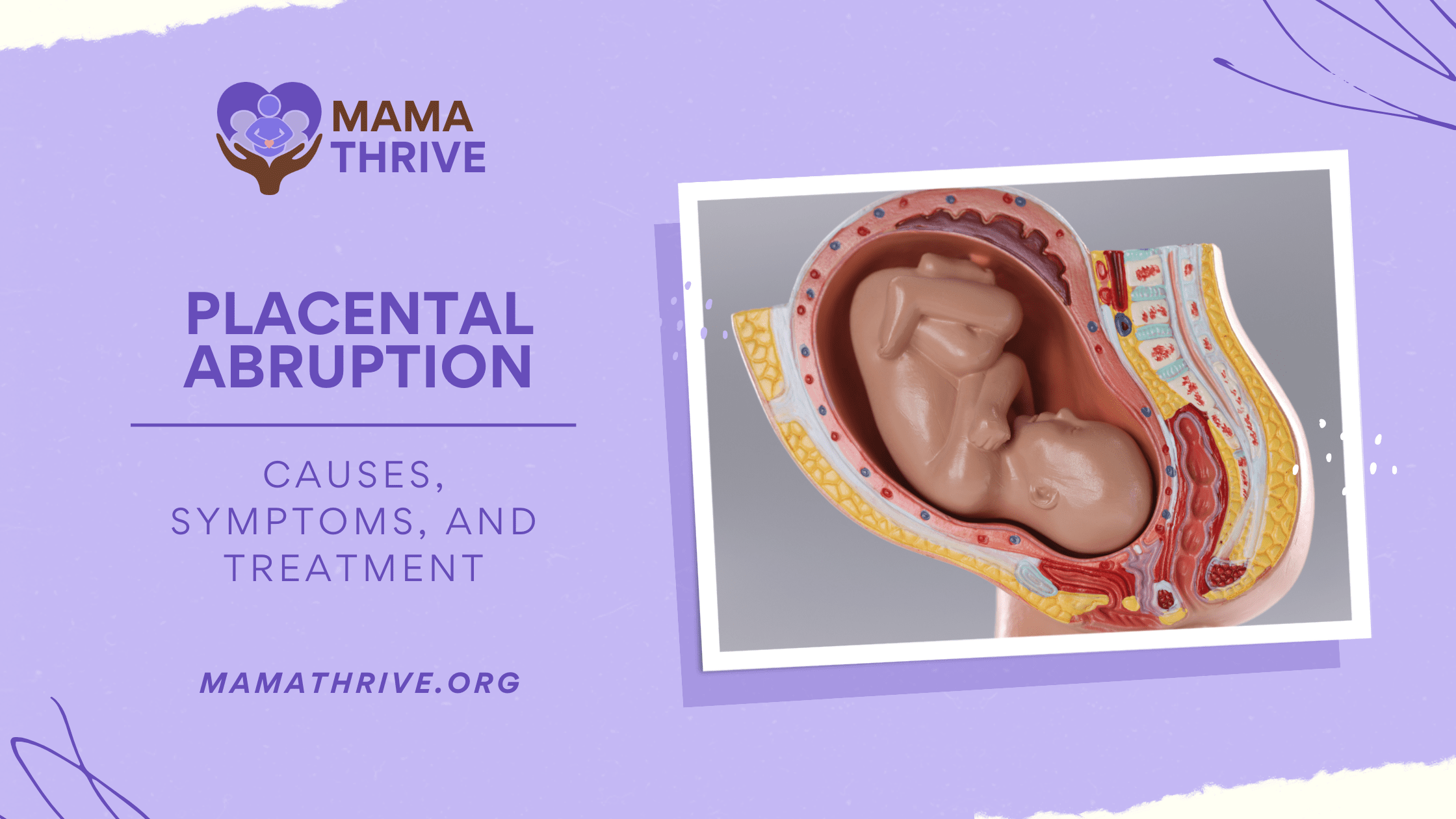Placental abruption poses a significant challenge in pregnancy, marked by the alarming scenario where the placenta detaches from the uterus prematurely, endangering both mother and child. The severity of this complication demands immediate recognition of its signs and urgent medical intervention to mitigate potential life-threatening outcomes. Addressing this critical concern, our article is meticulously designed to shed light on the underlying causes, identifiable symptoms, key risk factors, and effective treatment strategies for placental abruption.
What is Placental Abruption?
Placental abruption is a critical condition in pregnancy characterized by the premature separation of the placenta from the inner wall of the uterus. This detachment can occur partially or completely and usually happens in the later stages of pregnancy, though it can occur any time after the 20th week. The placenta itself is a crucial life-support system for the developing fetus; it provides oxygen and nutrients through the umbilical cord while also removing waste products from the baby’s blood.
The incidence of placental abruption affects about 1% of pregnancies but constitutes a major cause of maternal and fetal morbidity and mortality. When placental abruption takes place, it interrupts these essential functions by compromising the placenta’s ability to sustain the fetus, potentially leading to oxygen and nutrient deficiencies that can hinder fetal development and pose severe health risks. The severity of the condition can vary—mild cases may impact only a small portion of the placenta, while severe cases involve complete detachment, leading to significant complications or even fetal loss.
Causes
Placental abruption is a complex condition influenced by various factors, making its exact cause difficult to pinpoint. However, extensive research has identified several key factors and conditions that can significantly increase the risk of experiencing this serious pregnancy complication. Understanding these risk factors is essential for both healthcare providers and expectant mothers to mitigate risks and manage pregnancies more effectively.
High Blood Pressure
Chronic hypertension is a leading risk factor for placental abruption.
High blood pressure exerts extra strain on the blood vessels in the placenta, weakening them and potentially leading to detachment. Sudden spikes in blood pressure, often seen in conditions like preeclampsia, further elevate the risk, highlighting the importance of blood pressure management during pregnancy.
Abdominal Trauma
Physical impacts to the abdomen, such as those resulting from car accidents, falls, or incidents of physical abuse, can directly cause the placenta to detach from the uterine wall. These traumatic events can disrupt the delicate balance and physical connections between the placenta and the uterus, leading to abruption.
Previous Abruption
The occurrence of placental abruption in a previous pregnancy significantly increases the risk of it happening in subsequent pregnancies. This recurrence risk suggests a potential underlying predisposition in some women, which could be related to anatomical, physiological, or genetic factors.
Substance Abuse
The use of certain substances during pregnancy, notably tobacco and illicit drugs like cocaine, has been linked to an increased risk of placental abruption. These substances can constrict blood vessels and decrease blood flow to the placenta, contributing to the risk of detachment. Smoking, in particular, has been consistently associated with a range of pregnancy complications, including placental abruption.
Premature Rupture of Membranes
Premature rupture of membranes, commonly known as the water breaking early, can lead to changes in the pressure and environment within the uterus, sometimes triggering placental abruption. This condition can also be associated with infections and inflammation, which may further contribute to the risk of abruption.
Maternal Age
Advanced maternal age, typically defined as age 35 and older, is associated with an increased risk of placental abruption. As women age, the risk of chronic conditions such as hypertension and diabetes, which are themselves risk factors for placental abruption, becomes more prevalent. Additionally, the uterine and placental vasculature may undergo changes with age, potentially contributing to the risk.
Additional Factors
Other factors that have been observed to contribute to the risk include multiple pregnancies (twins, triplets, etc.), a history of certain surgical procedures on the uterus, and the presence of uterine fibroids or anomalies. Each of these conditions can alter the internal environment of the uterus, affecting the placenta’s ability to remain securely attached until delivery.
Diagnosis and Treatment
Diagnosis of placental abruption usually involves a physical exam, ultrasound, and monitoring of fetal heart rate and maternal blood tests. Treatment depends on the severity of the abruption, the gestational age of the fetus, and the condition of both the mother and the baby. Options may include:
- Immediate Delivery: In severe cases, especially if the fetus is mature, immediate delivery might be necessary to prevent life-threatening conditions.
- Hospitalization: For less severe cases, hospitalization to monitor the health of the mother and fetus may be recommended.
- Blood Transfusions: If the mother has lost a significant amount of blood, transfusions may be required.
Symptoms
Placental abruption presents through a variety of symptoms, which can differ in severity and nature among affected women. The manifestation of these symptoms is crucial for the timely diagnosis and management of this condition, which, if left untreated, can lead to serious complications for both the mother and fetus. Below is an expanded overview of the symptoms associated with placental abruption:
Vaginal Bleeding
Vaginal bleeding is one of the most recognizable signs of placental abruption, yet its presence and volume can greatly vary. In some cases, bleeding may be heavy and immediate, signaling a significant detachment of the placenta. In others, particularly where the placenta detaches at a location deep in the uterus, the bleeding might be minimal or even completely contained within the uterine cavity, making it less noticeable. The absence of visible bleeding does not necessarily indicate a less severe abruption, emphasizing the importance of other symptoms and diagnostic evaluations.
Abdominal Pain

The pain associated with placental abruption can be acute or chronic, ranging from mild discomfort to severe, unrelenting pain. It often originates in the abdominal area due to the detachment of the placenta and the subsequent irritation and possible bleeding into the uterine muscle. This pain may be localized or diffuse across the abdomen, depending on the extent and location of the abruption.
Back Pain
Back pain, particularly in the lower back, is another symptom that may accompany placental abruption. This pain can be attributed to the same processes causing abdominal pain, with the added factor that the uterus, as it contracts and reacts to the detachment of the placenta, can exert pressure on the back and pelvic areas, leading to discomfort and pain.
Uterine Tenderness and Contractions
The uterus may become particularly tender to the touch during placental abruption, a sign of irritation and possible internal bleeding. In addition to tenderness, women may experience uterine contractions that are more frequent and intense than the normal contractions associated with pregnancy. These contractions can range from regular pre-labor contractions to continuous, painful contractions that do not relent, indicating severe distress and potential compromise to the uterus and fetus.
Other Symptoms
In addition to the primary symptoms listed, there may be other indicators of placental abruption, including:
- Fetal Distress: Changes in the baby’s heart rate, detectable through fetal monitoring, may indicate distress and a lack of oxygen or nutrients due to placental detachment.
- Decreased Fetal Movement: Some women report a decrease in the baby’s movements, which can signal that the fetus is not receiving adequate support from the placenta.
- Shock: In severe cases, the mother may show signs of shock, including fainting, rapid heartbeat, and shallow breathing, especially if there is significant blood loss.
The presence of any combination of these symptoms warrants immediate medical attention. Healthcare providers will typically use a combination of physical examination, ultrasound imaging, and monitoring of fetal heart rate to diagnose placental abruption and assess its severity. The timely recognition and treatment of placental abruption are critical to minimizing risks and ensuring the best possible outcomes for both the mother and baby.
Placental Abruption Prevention
Preventing and managing placental abruption involves a multifaceted approach aimed at reducing known risk factors and ensuring the health and safety of both mother and baby throughout the pregnancy. While it’s true that not every case can be prevented due to the complexity of its causes, certain measures can significantly mitigate risks and improve outcomes:
Controlling High Blood Pressure
High blood pressure is a major risk factor for placental abruption. Managing this condition through lifestyle changes and medication, under the guidance of a healthcare provider, is crucial. Regular monitoring of blood pressure, adherence to a healthy diet low in sodium, maintaining a healthy weight, and engaging in regular physical activity can help keep blood pressure levels in check.
Avoiding Substance Abuse
The use of tobacco, alcohol, and illicit drugs like cocaine significantly increases the risk of placental abruption. Avoiding these substances before and during pregnancy is essential for reducing the risk of abruption and other pregnancy complications. Programs and support groups are available for expectant mothers struggling with substance abuse, providing resources and assistance to help maintain a healthy pregnancy.
Seeking Medical Attention for Abdominal Trauma
Any impact or trauma to the abdomen during pregnancy, such as from a fall, a car accident, or physical violence, requires immediate medical evaluation. Even if the trauma seems minor, it’s important to ensure that there has been no harm to the placenta or fetus. Prompt medical attention allows for early detection and management of any complications that may arise from the trauma.
Regular Prenatal Care
Consistent prenatal care check ups allow healthcare providers to monitor the pregnancy’s progress and identify any emerging risks or complications. During these visits, doctors can track blood pressure, test for gestational diabetes, monitor fetal growth and development, and offer advice on maintaining a healthy pregnancy. Regular check-ups provide an opportunity to discuss any concerns and receive timely interventions if necessary.
Monitoring and Managing Pre-existing Conditions
Women with pre-existing medical conditions, such as hypertension, diabetes, or clotting disorders, require careful management during pregnancy. Working closely with healthcare providers to monitor and manage these conditions can reduce the risk of placental abruption and other complications.
Conclusion
Placental abruption is a serious condition that demands immediate medical attention. By understanding the causes, recognizing the symptoms, and knowing the risk factors, expectant mothers can better prepare for and potentially mitigate the risks associated with placental abruption. Always consult with a healthcare provider for guidance and treatment if you suspect you might be experiencing symptoms of placental abruption. Early detection and proper management can significantly improve outcomes for both mother and baby.
Through increased awareness and education, we can improve the prevention, early detection, and treatment of placental abruption, ensuring safer pregnancies and healthier futures for mothers and their children.





